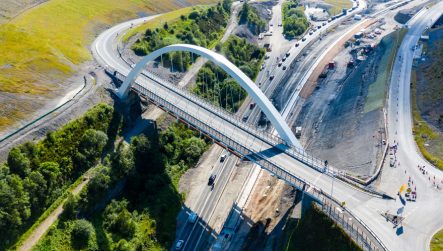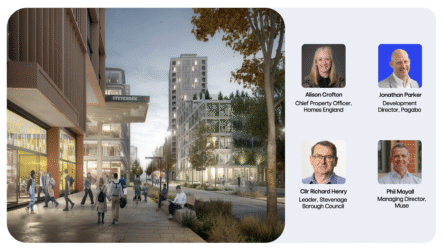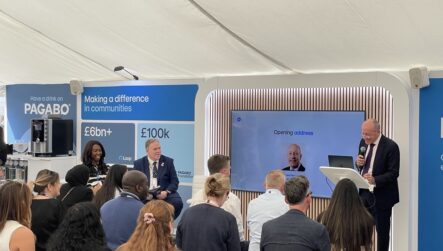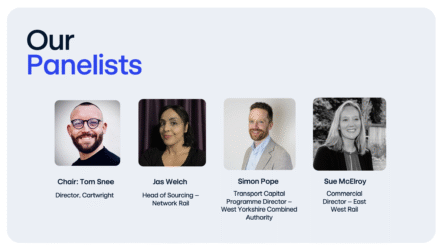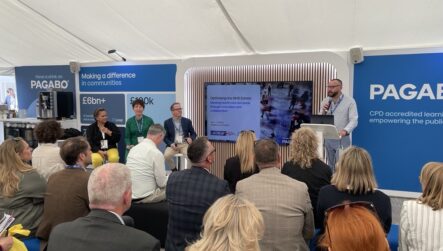Insight Report: Pagabo Live | The Journey Towards Digitisation for Public Sector Projects

The construction industry’s slower paced approach to digitisation has been well documented for some time now, which is why our latest episode of Pagabo Live delved deeper into the public sector’s journey towards it.
Keen to gather a range of perspectives for what is such a prevalent topic, our host, Tom Snee of Cartwright Communications, was joined by Pagabo’s very own director of national delivery, Karen Carter, Charley Wainwright, head of partnerships and integrations at contract management software provider Sypro, and Jacqueline Byrne, director at HBE, a leading provider of water and legionella services.
No topic was left off the table, putting focus on challenges and solutions – and most importantly how the public sector can create efficiencies, save time and streamline budgets to ultimately domore with the right digital tools in place. While a poll at the beginning found that more than 80% of attendees were not very aware of the different ways the industry is looking to digitise public sector projects, this flipped to 85% stating better awareness at the end of the session.
A challenging public sector landscape
The public sector faces no end of challenges, with budgets and resources continually squeezed. However, whether it’s recruitment freezes, a shortage of skilled individuals, or simply a need for greater efficiencies and better access to data, digitisation can help.
Software can help manage vital parts of a project journey – such as procurement or contract management – but with technology continuing to develop at pace there are always new opportunities to be found. Jacqueline detailed the way in which the Internet of Things (IoT) and the need for adaptation throughout the Covid-19 pandemic has allowed HBE to develop remotely managed sensors to drastically reduce the manpower needed for legionella management and compliance.
Not only has a labour-intensive manual task been streamlined for estates teams – particularly for those with larger or aging assets in the public sector – levels of safety have been improved, and a huge amount of water is also able to be saved by the less manual flushing of water systems required.
However, one key theme that came from this part of the discussion was that by pushing for a more digital industry, that does not mean pushing for a ‘digital only’ industry. There is always a place for human angle, which is very much key in getting the most out of digitisation tactics. Tools are there to allow people to make the right decisions, while saving time and money – effectively letting them do more with less.
These challenges were reflected by the audience poll around the areas they feel could be improved within their own organisations through increased digitisation. A fairly even split across almost all areas – resource management, procurement processes, social value, compliance, commercial protection, risk management, and data management – reflects the challenges at hand for many. But with those challenges, comes the opportunity for digitisation to transform how a business operates.
The winds of change
The three panelists agreed that a clear change is being seen across their varying specialisms.For the construction industry, there has been a focus on digitisation since the publication of the Construction Playbook in 2020 – and more recently the Building Safety Act legislated the need for ‘the golden thread’ of digitally recorded information for all high-rise buildings.
For procurement, Karen highlighted the incoming Procurement Act and its much clearer need for utilisation of digital practices to deliver greater efficiencies and transparency, which in time may also lead to a level of digital standardisation. All of this seeks to streamline and simplify procurement processes especially for the public sector – with frameworks like those we manage here at Pagabo on behalf of contracting authorities adding that extra level of compliance backed by our procurement specialists.
Automation is an easy-to-understand area of benefit, reducing manpower and freeing up resources for elsewhere. Jacqueline cited a notable uptick in understanding across estates management teams on these benefits, and while only 20 to 30% of the market is currently adopting a digital approach, the number is only continuing to grow.
The benefits of digitisation can also help streamline and manage vital parts of the project journey. Contract management is one such area, which as highlighted by Charley can be a complex and time-consuming project requirement. However, software such as Sypro brings everything together in one central system that drastically reduces both complexity and time, with clients reporting up to 35% reductions in the time needed on their contract management.
A central system brings with it clarity on actions and responsibilities, fostering much closer collaboration across the project team – and gives complete transparency and version control to reduce miscommunication or error. All of this protection is vital for safeguarding public sector investments – and when considering that the most common reason for contract disputes is attributed to poor contract administration, at what point does the discussion move from ‘cutting costs’ towards not being able to afford not to have such protective tools?
Using past experiences to better the future – data informed decisions
In any line of work, it is always important to learn from past experiences and avoid making the same mistakes, and this is no different for construction. In fact, it is a pattern for the industry, with the panel citing examples including the collapse of Carillion in 2018, the Grenfell Tower tragedy, and more recently the Covid-19 pandemic.
Through digitisation, we can not only learn from these past experiences but find power in the data too. Only by having better collection and administration of data will we be able to have that high-grade analysis that brings the informed decisions that could move the needle for the industry. By its nature, construction makes incremental gains rather than overnight change. With such high value projects, it is simply too risky for an organisation to try untested ways of working, but through wider collaboration and adoption of the right technology solutions, those incremental gains can quickly stack up.
With the UK construction sector continuing to face turbulent times, there simply isn’t the room for mistakes, because the time to rectify them or the money to fix them just isn’t there – which is why the assurances digital gives is so important, especially for publicly funded schemes.
While there is still a lot of work to be done in terms of digitisation, there is definitely progressbeing made. Integrations between technology solutions – such as between our own Pagabo+ platform and Loop for social value measurement, and Sypro’s connection with Power BI to enhance reporting functionality – only improves the benefits that can be gained.
The public sector arguably has the most to gain by adopting a more digital approach to how it operates, streamlining the resource and time needed from its teams to deliver the most value possible from public funds.
Listen back to the full episode of Pagabo Live, on YouTube or Spotify now.
The next episode of Pagabo Live will put a spotlight on the measures announced in the upcoming Autumn Budget and what they mean for the public sector. Join us on Wednesday 20 November by registering for free here.
Discover our frameworks

